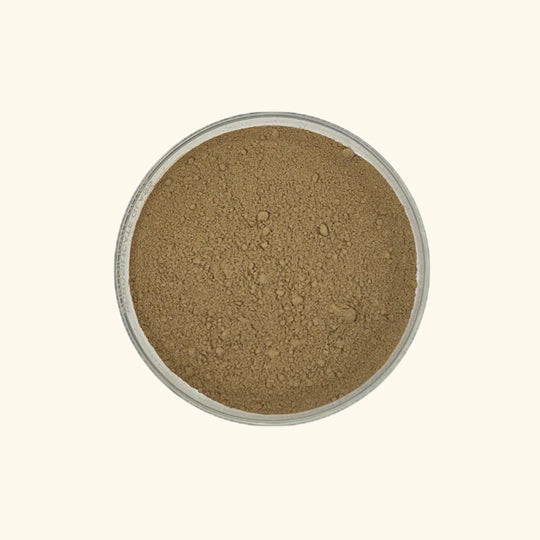In today's world of healthy living, all of us strongly support self-care. Taking baths has been one of our favourite ways to relax physically and emotionally recently. There are many ways to practise the art of taking care of one's body and mind, but nothing beats taking a hot, bubble-filled bath at the end of a hard day.
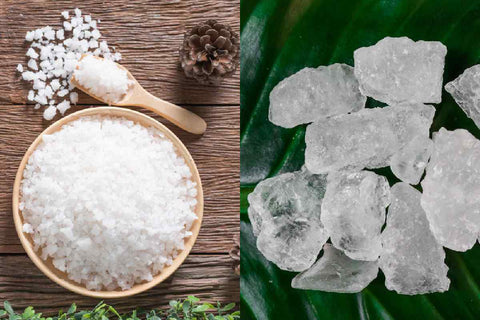
But with so many bath salts available out there, how do you choose one? Alum and epsom salt are two of the most popularly used bath salts. Why are these salts so calming and what's in them? Learn what alum and epsom salts do to help you relax and the differences between them.
What Is Epsom Salt?
Epsom salt, also known as magnesium sulfate, is a naturally occurring mineral compound that is made up of magnesium, sulfur, and oxygen. It was first discovered in Epsom, England, where it was found in the water of natural springs.
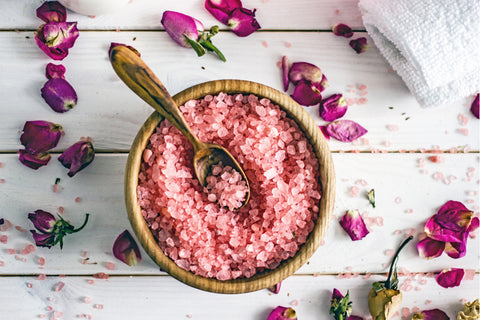
Epsom Salt is often used in a variety of ways, including as a natural remedy for a range of ailments, as a beauty product, and as a gardening aid. Epsom salt is commonly used in bath salts and foot soaks, where it is believed to help soothe sore muscles, improve circulation, and promote relaxation.
What is Alum?
Alum, also known as potassium alum or aluminum potassium sulfate, is a naturally occurring mineral compound that is commonly used in a range of applications, including as a food additive, a pickling agent, and a cosmetic ingredient.
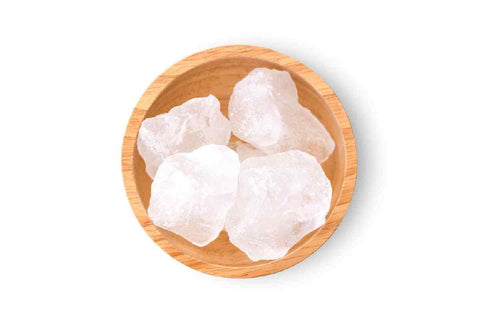
Alum has astringent properties, which makes it useful in cosmetic products such as deodorants, antiperspirants, and aftershaves. It is also sometimes used as a natural remedy for conditions like canker sores and mouth ulcers.
Epsom Salt Vs Alum: Benefits?
Epsom salt and alum have different properties and benefits, and are used for different purposes. The benefits of Epsom salt and alum are quite different, and their uses are largely specific to their individual properties.
Epsom Salt:
1.Exfoliation: Epsom salt can be used as a gentle exfoliant to remove dead skin cells and reveal smoother, softer skin.
2.Soothes Skin Irritation: Epsom salt has anti-inflammatory properties that can help soothe skin irritation and reduce redness.
3.Improves Skin Hydration: Soaking in a bath with Epsom salt can help improve skin hydration by increasing water absorption.

4.Helps with Acne: Epsom salt can help with acne by reducing inflammation and removing excess oil from the skin.
5.Calms Itchy Skin: Epsom salt can help calm itchy skin caused by conditions such as eczema and psoriasis.
6.Relieves Muscle Aches: Epsom salt can help relieve muscle aches and pains by reducing inflammation and improving blood flow.
7.Reduces Stress: Epsom salt can help reduce stress and promote relaxation by helping to regulate the body's levels of magnesium, a natural stress reliever.
Alum:
1.Astringent properties: Alum has astringent properties that can help tighten the skin and reduce the appearance of pores.
2.Reduces body odor: Alum is commonly used as a natural deodorant, as it can help control body odor by inhibiting the growth of odor-causing bacteria.

3.Treats Acne: Alum has antibacterial properties that can help kill acne-causing bacteria and reduce inflammation.
4.Soothes Razor Burn: Alum can help soothe razor burn and prevent ingrown hairs when applied to the skin after shaving.
5.Reduces Dark Spots: Alum can help reduce the appearance of dark spots and blemishes by exfoliating the skin and promoting cell renewal.
6.Alleviates Itching: Alum can help alleviate itching caused by insect bites, rashes, and other skin irritations.
7.Acts as a Natural Toner: Alum can be used as a natural toner to balance the skin's pH and improve its overall appearance.
Epsom Salt Vs Alum: Uses
Epsom salt and alum are two different substances that have different uses. Here are some common uses of each:
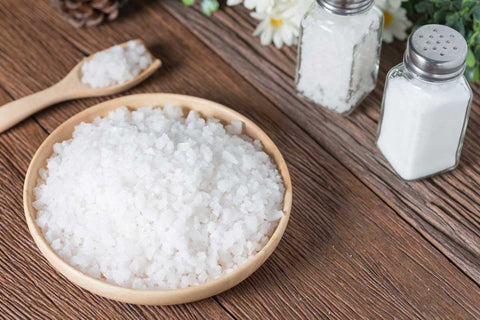
Epsom Salt
1.Bath soak: Epsom salt can be added to a warm bath to help soothe sore muscles, improve skin hydration, and promote relaxation.
2.Foot Soak: A foot soak with Epsom salt can help reduce foot odor, soothe tired feet, and improve circulation.
3.Exfoliant: Epsom salt can be used as a gentle exfoliant to remove dead skin cells and reveal smoother, softer skin.
4.Hair volumizer: Adding Epsom salt to your hair care routine can help add volume and texture to your hair.
5.Gardening: Epsom salt can be used as a natural fertilizer to help promote healthy plant growth.
Alum
1.Deodorant: Alum can be used as a natural deodorant to help control body odor.

2.Toner: Alum can be used as a natural toner to help balance the skin's pH and improve its overall appearance.
3.Acne Treatment: Alum has antibacterial properties that can help kill acne-causing bacteria and reduce inflammation.
4.After Shave Treatment: Alum can help soothe razor burn and prevent ingrown hairs when applied to the skin after shaving.
5.Pickling Agent: Alum can be used as a pickling agent to help preserve fruits and vegetables.
Epsom Salt Vs Alum For Bath
Both Epsom salt and alum can be used in a bath, but they serve different purposes. Here's how they compare:
Epsom Salt:- Adding Epsom salt to a warm bath can help soothe sore muscles, reduce stress, and promote relaxation.
- Epsom salt is a good source of magnesium, which is an essential mineral that can be absorbed through the skin.

- Epsom salt can help improve skin hydration and exfoliate dead skin cells.
- Alum can be used in a bath as a natural deodorizer to help control body odor.
- Alum has astringent properties that can help tighten the skin and reduce the appearance of pores.
- Alum can help alleviate itching caused by skin irritations.
Epsom Salt Vs Alum: Which Is Better?
On the other hand, alum is primarily used as a natural deodorizer, to tighten the skin and reduce the appearance of pores, and to alleviate itching caused by skin irritations.
There is no clear answer as to whether epsom salt or alum is better for a bath, as they serve different purposes. Epsom salt is primarily used to help soothe sore muscles, promote relaxation, and exfoliate dead skin cells.
Can Epsom Salt Be Used Instead Of Alum?
Epsom salt is primarily used to help soothe sore muscles, reduce stress, and promote relaxation, while alum is primarily used as a natural deodorizer, to tighten the skin and reduce the appearance of pores, and alleviate itching caused by skin irritations.
Epsom salt and alum serve different purposes in a bath, so they cannot be used interchangeably. Using Epsom Salt instead of alum may not provide the same benefits for controlling body odor, reducing pore size, or alleviating itching. However, Epsom salt can be a great addition to a bath for its muscle-relaxing and stress-reducing properties.
Conclusion
The choice of which substance to use in a bath will depend on the individual's needs and preferences. If you're looking to relax after a workout or soothe sore muscles, Epsom salt may be the better option. If you're looking to control body odor, tighten the skin, or reduce the appearance of pores, alum may be the better option. Both these options can be bought right here, at Veda Oils.













 Sign in
Sign in Register now
Register now My Reward Points
My Reward Points

